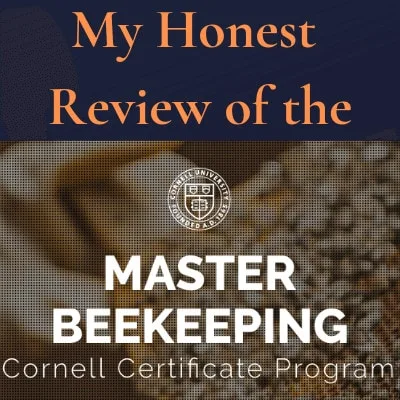
Today is the day! It’s February 20, 2019 to be exact. Today marks the first day of my enrollment in the eCornell Master Beekeeping Online Certificate Program.
Table of Contents
Considering this program for yourself?
In this post I will be providing my honest feedback of the course. What I liked, what I didn’t, and my final thoughts. I will update as the class proceeds, so be sure to check back for updates!
Eligibility
In order to enroll in the Master Beekeeper certificate course, applicants must have at least three years of beekeeping experience as the program is built to increase beekeeping operation success, extend business opportunities and gain credibility as a knowledgeable resource in the beekeeping community.
The program is composed of 5 classes that span 15 months. The classes take a break over the summer to allow beekeepers time to manage their apiary. Courses run from October-April.
PIN THIS POST

Tuition
At the time of publishing this article, the course is $899. At the end of the program, you’ll have to visit the Dyce Bee Lab in New York for a final hands on evaluation, which adds an additional cost for most. It is my understanding that the hands on exam can be replaced with an alternate testing option that does not require the trip, but does come with an increase in tuition.
Instruction is completely online via video and reading, and does not require any textbooks or other material.
Instructors
The class is taught by industry experts like Thomas D. Seeley, PhD., Emma Mullens, Katherine Urban-Mead, Kimberly Carpenter, Ben Carpenter, and Eleanor Andrews.
Program Layout
The program is broken down into five courses. Four of these are online instruction courses, and the fifth part is the examination series.
Each course is broken down into individual topics (4-9 topics depending on course). These topics have associated instruction text and videos, a discussion and quiz. The classes are “learn at your own pace”, with material being due by the last day of class. A schedule is provided with suggested deadlines to help students stay on track
The instruction courses are entirely online and do not require a textbook. You may also download a pdf version of the class for future reference.
The examination series is composed of a comprehensive written exam, oral presentation with slide show, and hands on field exam. The written exam and field exam take place at the Dyce Lab on the Cornell University campus in Ithca, NY
Assessment
The classes are pass/fail, with no set grade attachment. Throughout the course there are a number of quizzes, discussions and a course project. The quizzes must receive a score of at least 80%, however they can be taken an unlimited number of times so those with test anxiety can take a sigh of relief. Expect to spend 4-7 hours per week completing your course.
Final Exams
After completing and passing the 4 educational courses, the 5th course is an examination series that runs from March to September. There are three exams in order to complete the program and obtain the Master Beekeeper certificate- comprehensive written exam, oral presentation with slideshow, and hands on field exam.
Courses
See the complete list of topics taught in each class: Cornell University Master Beekeeper Program Course Overview
COURSE 1- HONEY BEE EVOLUTION, BIOLOGY AND BEHAVIOR
The program starts with Honey Bee Evolution, Biology and Behavior, which is a 3 week class that should take about 10 hours to complete in its entirety. There are 6 parts to this class:
- The Evolution of the Honey Bee Colony as a Superorganism
- Honey Bee Reproduction
- Honey Bee Development
- How Honey Bees Communicate
- Honey Bee Biology
- How Honey Bees Construct and Maintain their Nest

COURSE 2- THE SCIENCE AND ART OF BEEKEEPING
The Science and Art of Beekeeping teaches a systematic approach and application of practical techniques to successfully and effectively manage hives.
- Identify seasonal needs and management practices to support honey bee health
- Understand how to conduct an effective hive inspection
- Identify how to meet your colonies’ nutritional needs
- Explore swarming: preventing, catching, and baiting
- Identify robbing and learn how to intervene
- Identify when you want to requeen your colony
- Manage colony growth: when and how to split and merge colonies
- Understand how to breed bees and rear queens for the traits you desire
- Explore how to keep records to learn more about your colonies
COURSE 3- MANAGING PESTS AND DISEASES
The third class in the series increases knowledge of honey bee immunity and Integrated Pest Management (IPM) principles to control pests, pathogens and parasites.
- Explore how honey bees naturally combat infections through immune function and social behavior
- Apply the benefits of Integrated Pest Management
- Identify, prevent, and control
- Pests and parasites
- Viruses
- Bacterial Infections
- Fungal Infections
- Combination Syndromes
- Explore what we can learn from and how we can protect native bees
COURSE 4- THE REWARDS AND CONTRIBUTIONS OF BEEKEEPING
This course covers the financial benefits possible with beekeeping, including how to grow a beekeeping business and marketing major hive products. Additionally, the course delves into contributing to the beekeeping society by way of mentoring, raising awareness of pollinator issues, education and outreach.
- Explore the business considerations of turning your bees into profit opportunities
- Identify major honey bee product and service opportunities and considerations
- Participate in beekeeping-related organizations that fit your specific needs while enabling you to give back to the beekeeping community (and the bees!)
- Understand laws, regulations, and registration requirements impacting beekeepers
- Identify credible and reputable sources of information in order to stay current in bee research
- Effectively contribute to citizen science and data collection
Course Platform Video
COURSE 5- EXAMINATION SERIES
Written Exam
The written exam is a comprehensive exam coving the course material and is to be taken at Dyce Lab, Cornell University, in Ithaca, New York. It has multiple choice, short answer and long answer questions. A score of 70% or higher is required to pass.
Oral Presentation
The oral presentation is a 15 minute lecture and slide show covering beekeeping knowledge and research beyond that taught in the course. This can be completed remotely via video conference or in person at Dyce Lab.
Field Evaluation
Students will work one on one with an instructor at the Dyce Lab apiary to demonstrate knowledge, confidence and ability to perform the following (but not limited to):
- Performing a split
- Performing a merge
- Making a nuc
- Performing proper inspections
- Identifying pests and diseases
- Monitoring for pests and diseases
- Handling queens
- Assessing the nutrition of the colony
- Troubleshooting issues
Program Review
Update #1: FEBRUARY 26, 2019- First Impression
Being that I am only a week into the class, I can only provide my initial thoughts on the course.
So far I have found the material to be as expected for a college level course. I have already learned a lot about bee genetics, and have several pages of notes. The instructor was quick to answer my question on the discussion board.
The class interface is simple, but I found it a little clunky in the beginning to navigate (I have taken many online college classes in the past, and those class dashboards were a little easier to get around). That being said, it is easy to figure out after a few lessons.
I spend about 3 hours a week on the course material, but I love learning, especially about bees, so it is an enjoyable 3 hours.
Update #2: January 28, 2020- Completed Coursework
As of today, I have completed all 4 didactic courses, and am now awaiting the details to schedule the 5th “course”, which is the final examination series held at the Cornell campus in Ithica, NY.
I found all 4 courses to be extremely educational and enjoyable. They met my expectations on the caliber of material for a Master Beekeeping program. I found this course especially convenient as it is all online. While Colorado does offer a Master Beekeeper Certification Program, the syllabus looks very “busy” and requires a lot of time- something I am limited on. And while the Colorado program has several excellent instructors, I felt like the course layout, material and instruction from the Cornell program was a better fit for my individual needs.
My only “complaint”, is I wish the courses were 3-4 weeks long instead of 2.5 weeks. Now that I have a full time job and work every day, it was challenging to complete the course in the allotted time. I like to go through the material very thoroughly- read, take notes, read again, etc. I felt very rushed to complete the class in a short time. While I don’t have children, I’m told that I am busier than most folks, so it may just be a personal challenge.
Overall, I highly recommend this course to anyone that is considering it!
Update #3- Final Examination (Will update when complete)
I have yet to complete the final examination series at the Cornell campus. However, once I do, I will add an update. I’m told that the final exam series will be scheduled in February, and takes place June-October.
PIN THIS POST


Jimmy
Friday 5th of July 2019
I'm considering this program. How's it going? I'm emailing them to get more info. So you can get your master beekeeping in just under 1.5 yrs?
Brian Negrette
Wednesday 9th of February 2022
@Nicole, what was the end result?
Nicole
Monday 3rd of February 2020
Sorry for the delay, but I had no updates over the summer. The post has been updated!